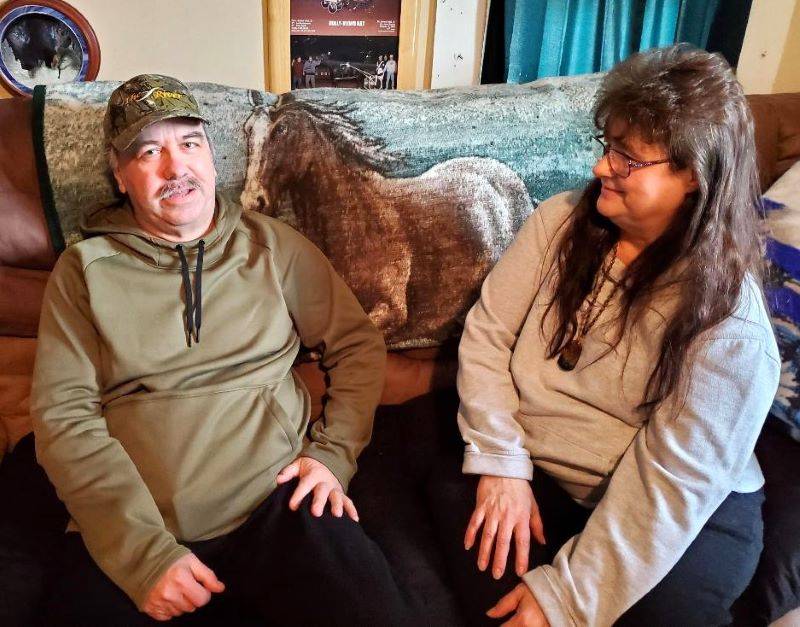
After eight years on dialysis and currently living with a deteriorating transplanted kidney, Batavia resident Jim Urtel Jr. is reaching out to a charitable organization that has taken a page from the “it takes a village” model.
Urtel, 54, a Le Roy High School graduate and longtime trainer/groom of racehorses, needs a second kidney transplant – this time from a live donor.
In an effort to speed up the process, he has connected with Kidneys for Communities, a nonprofit that is dedicated to increasing the pool of living kidney donors in the United States.
“I found out about Kidneys for Communities last June from an old friend, her name was Pam, that I met back in 2020, when I got the first transplant,” Urtel said on Friday. “I just started looking online to see if I could find any help or something. Thankfully, this (organization) helps people like me who need a kidney from a live donor.”
Urtel, encouraged by his parents and by his partner of 30 years, Renee Hozlock, is doing the things he needs to do – exercising regularly (he’s dropped 50 pounds), counting his calories, drinking plenty of bottled water and maintaining a positive attitude – as he waits for a donor.
Prior to 2012, Urtel was busy in the harness horse racing industry, mostly in Pennsylvania. An only child, he came back to Batavia to be there for his mom after his grandmother became ill.
“I was getting ready to work for a guy at the track here in Batavia and I had been a little bit sick for about a week or so. When I laid down at night, I had trouble breathing,” he recalled. “So, I decided to go to the emergency room and get checked out. I thought I had pneumonia or maybe bad bronchitis.”
After testing, he was told that his blood pressure “was through the ceiling,” he said, and that his kidneys had shut down.
“I had untreated sleep apnea and that was raising the blood pressure,” he said.
It was then that he started on dialysis and that lasted for eight years before he received a transplant in 2020 from a deceased donor. As it turned out, there were problems with the transplanted kidney.
“The first year was rough. I had tons of extra fluid. They couldn’t regulate the blood pressure and I gained 50 pounds,” Urtel said. “Little did I know, this kidney was bad, they didn’t tell me that. I think it was a little bit of a little story to keep me going.”
Tested recently, it was determined that his kidney failure risk factor was at a high level, once again making him eligible for a transplant.
“This time, it's going to have to be a live donor because I already did eight years of dialysis and the average lifespan on dialysis is seven,” he said. “That’s why I’m working with Kidneys for Communities. They have pairing programs and other ways to find matches.”
While Renee said she was willing to donate one of her kidneys, she’s not a match.
The chief executive officer for Kidney for Communities said he can relate to Urtel’s plight.
“First of all, I'm a kidney recipient myself,” Atul Agnihotri said by telephone on Friday. “So, I sort of know what Jim's going through and that’s the foundation of how we started this organization. I felt that I got lucky when I received my kidney, and a lot of people in the same journey with me were not as lucky.”
Agnihotri said his organization focuses on sharing patients’ stories in their own communities to maximize their chances of receiving transplants.
“We know that within the community is where the affinity, the relationships and identification is the strongest,” he said. “And members are willing to help other members. A community could be that you are living in a smaller city were people have this binding relationship with each other, or you could be going to the same church.”
Kidneys for Communities does not charge a fee to donors, recipients or transplant centers, Agnihotri said.
“We collect our own funds. All our funders currently are people that are associated with kidney disease, either their themselves as recipients, family members of the recipients or their donors,” he explained.
“If you look at our organization, we have an incredible list of people that are associated with it. A lot of those people are altruistic donors, meaning that they just kind of like walked in and said, whoever needs a kidney, I'm willing to give one.”
And that’s just the type of person that Jim Urtel is hoping to find.
For more about how to help Urtel: https://kidneysforcommunities.org/recipient/jim-urtel/
For more information about Kidneys for Communities, go to www.kidneysforcommunities.org.
